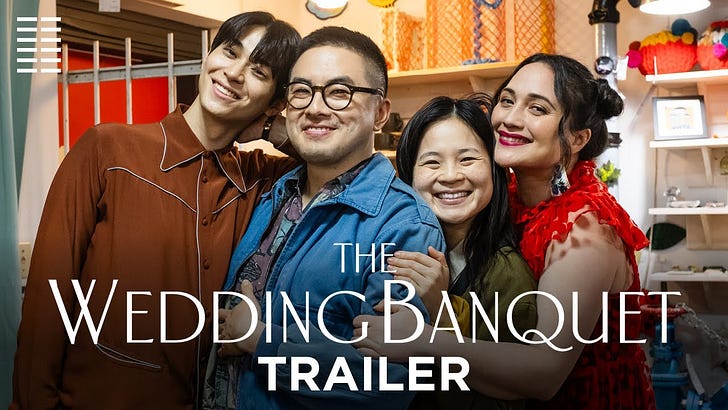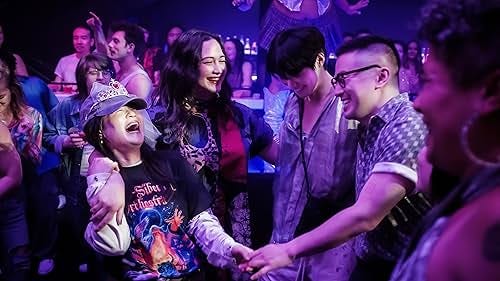The Wedding Banquet
Two Seattle gay couples cook up a plan to cross-marry partners for immigration and familial purposes, resulting in a joyless, sitcom-y remake.
1993’s “The Wedding Banquet” was the American breakout film for director Ang Lee, who went on to a terrific mainstream career including an Oscar win. It was the story of a Taiwanese immigrant to the U.S. who married a female friend to help her get a green card and placate his influential family, who don’t know he’s gay.
I’m not really sure why anyone thought it needed a remake, but here it is.
It’s been updated… a bit. But it still feels like an archaic ‘closeted gays’ premise, just with a few modern nods thrown in. It also throws in a second LGBTQ couple, and they wind up cross-marrying for both immigration and familial purposes. Plus, infertility issues and financial challenges tossed on top of all that.
Directed by Andrew Ahn from a screenplay he cowrote with James Schamus — a holdover from the original — The whole thing winds up feeling very sitcom-y and joyless, like a mashup of “The Birdcage” and “The Odd Couple.”
It stars Bowen Yang, Kelly Marie Tran, Lily Gladstone and Han Gi-chan as the foursome of friends — Chris, Angela, Lee and Min, respectively. Three of the four are Asian-American… well, technically one is here on a student visa, so not a citizen.
“I don't even want to be an American. The trains are so slow and I don't know how much to tip,” says Min, in literally the only line in the whole movie that made me LOL.
Both are long-term couples but not yet married. Lee and Angela live in Lee’s family house she inherited; Lee does social work for LGBTQ groups and Angela is a “worm scientist,” to use Lee’s dismissive phrase. As the story opens they are trying to conceive through IVF, which is hard for them to afford.
Angela is highly resentful of her mother, May (Joan Chen), who initially shunned her when Angela came out as a lesbian, but turned the corner and leaned into being a supportive parent of a gay child — too far, in fact. She has just been given the Ally Award for her work in the gay community, but to Angela’s eyes her mom is always making it all about herself.
Chris is an academic taking a long break from his dissertation, leading birding groups through city parks. He lives in the garage apartment of Lee’s house with Min, a student from South Korea who has taken an even more casual approach to his studies.
The precipitating event is that Min’s grandmother, Ja-Young (Youn Yuh-jung), threatens to cut him off from the family fortune unless he takes over their business, which is acquiring a major Korean fashion brand. Min is a sweet, simple kid who just wants to make art and love Chris.
He proposes to wed Chris, but it’s taken the wrong way as a mercenary act just to secure his green card. It’s also clear Chris is not emotionally ready for a sudden move.
After their IVF fails and they lack the funds to try again, Lee suggests Angela try to be the birth mother instead of her, as Angela is younger. Just like with the other couple, a seemingly logical move is rejected for emotional reasons. (It’s also left unaddressed why the two have not wed long ago.)
Min comes up with a kooky idea: what if he marries Angela, gives the money for the IVF from his resumed trust fund tap, and they all live happily ever after with this lie?
Seems like a plan until grandma insists on coming over to stage an elaborate traditional Korean wedding, complete with media coverage, to protect the family name. These leads to more sitcom scenes like the foursome working frantically before the old lady’s arrival to “de-gay” their abodes.
It’s a handsome, likable cast and I hate to see them misused in such a downmarket piece of filmmaking like this.
The movie seems colossally unambitious, seeming to want to coast on supportive ‘gay vibes’ for an audience they’re taking for granted. I have to say, the depiction of queer lives isn’t a particularly positive one, with a lot of stereotypical endeavors like constantly drinking, dancing and eating all their meals out while they gripe about their lack of money.
“The Wedding Banquet” is full of color and light, and I’m sure will be embraced by the folks it’s squarely aimed at. But it doesn’t past the first test of assessing a film: does this movie need to exist? I suggest declining this invitation, and go rent the original.





